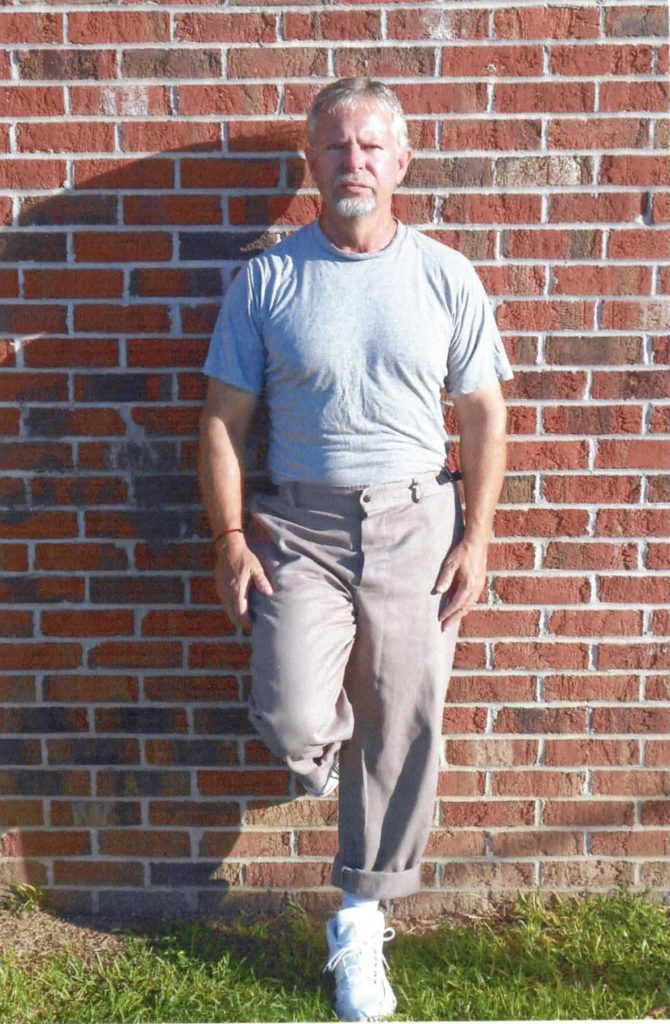Back on the mountain, she stays alone most of the time. She lives in a large mobile home that she and her deceased husband bought years ago. It’s nestled along the Blue Ridge Parkway in the mountains of central Virginia. She lives there with her Persian cat, Patches, and sometimes she receives visits from wild packs of coyotes, rabbits, and deer. When the coyotes and deer come around, she often tells herself she wishes she could kill a few of them. She tells herself this because they are almost always trampling her shrubs and rummaging through her trash cans and garden. Sometimes she’ll commence to hollering at them. She’ll say, “Get yonder,”and they’ll run off. But she knows they will return.
She has neighbors that live about a mile down the road. But most of them drink booze and stay shut in for weeks at a time. When they come out, they usually just go to the store for more beer and snacks. Sometimes they’ll wave from a distance. She’ll wave back.
Her daughters and grandchildren come visit a few times a month. She tells them that she plans to move into town soon, find an apartment, get closer to folks, maybe have some neighbors to talk to from time to time, that she is lonely and needs friends. She tells them this each time they come to visit her. Of course, they listen as she tells them. But they don’t say much one way or the other. Deep inside, she doesn’t feel as if they care or take her seriously enough when she tells them.
She has a son that’s doing time in the North Carolina prison system. He calls and they talk a few times each week. They talk mostly about the weather, her loneliness, and how she’s been feeling. About every time he calls, she also expresses to him her plans to get an apartment in town so she can be around other people. She tells him this about every time he calls. She’ll say, “Well, Charley, I can’t live like this no more. There’s no one around here. It’s always foggy around here. I need to get out, find an apartment somewhere in town.” Of course, he always encourages her to get the apartment, that it would be good for her to get away. He’ll say, “Well, Momma, go ahead and do it. Get one in town. It will be good for you to be around other people.”
She’ll say, “I know, I know,” and then she’ll say how bad she feels. He says he understands, that he wishes he could help her. Then they’ll start talking about kinfolk, what they are doing in their lives—who’s gotten married, divorced, or passed away. She’ll then ask the son what he’s been up to. But the son doesn’t say much about his life because he doesn’t want to upset her, make her worry. Then she’ll start talking about the fog again.
She spends most of her days by herself trying to find work around her house. Some days, when the weather is right, she’ll rake leaves or prune shrubbery. Other days she’ll burn trash or sweep off the small porch she often uses in the evening time to watch the birds and coyotes. On a few occasions, she has painted the porch or railings. But never at the same time. One time she mentioned painting the window frames. But then she would have to climb a ladder and she reconsidered that job for fear of falling.
She often admits to herself that she is not as mobile as she used to be, that she has limitations, being that she is now in her 70’s. Yet, she knows it’s necessary for her to stay busy, to find something to do, something to keep her mind occupied. After a while of working outdoors, she’ll remind herself that she needs to call somebody. She does this almost daily. It’s routine now. She’ll usually call her sister, her daughter, or a relative.
Today she calls her sister Hazel. Hazel lives in the town of Gladesboro. She’s lived there for many years now. She, too, lives in a mobile home, a widow whose husband passed away twenty-plus years ago. She doesn’t work anymore. Like her sister, Leona, she is in her 70’s, and she spends most of her time alone. When she calls, Hazel is frying an egg.
“Hello,” says Hazel.
“Just thought I’d call and see how you are doing,” says Leona.
“I’m doing aright, Leon-ee (“Lee-on-ee”—that’s how she pronounces her name). I just put an egg on the stove. Could you hang on a minute?”
“Alright, alright—don’t burn anything.”
Hazel gets the egg off the stove. She puts it into a bowl, then covers it with a saucer.
“Alright, I’m back.”
“You can go ahead and eat; I’ll call back directly.”
“It’s alright, I got it covered up.”
“I just wanted to call and see how you’ve been doing.”
”I’m all right. It’s been cold here for the past week. It feels like it might snow,” she says hurriedly as if she’s standing outside in the elements.
“It’s been foggy here,” responds Leona. “Been like this for days now. It seems like it stays this way nowadays.”
“You heard about Leonard Wayne (Leonard is their nephew)?” asks Leona.
“What’s he done gone and did?”
“He’s done gone and got himself another DUI last week. Don’t say anything. He might get himself some prison time this time.”
“Well, I declare. He can’t let that drinking go, can he?”
“Don’t seem he can.”
“I don’t quite understand ’em,” says Hazel.
“Beats all I’ve ever seen, Hazel.”
“Yeah. Well, I guess he won’t be able to drive now.”
“I guess he won’t,” agrees Leona.
“You heard from Tammy Lee?” asks Hazel.
“Not lately.”
“Huh.”
The line grows silent for a while, save for a buzzing sound in the background. After a while, Leona says, “Well, honey, I’m gonna get off here now. I’ll call you again at the end of the week.”
“Alright, then. I’ll talk to you directly. You take good care now, hon. Goodbye.”
She hangs up the phone, then looks out the kitchen window and watches Patches walk across the yard. The cat stops for a minute, then stares up at a sparrow that sits atop a locust limb. She gets low and crawls toward the tree. The sparrow flies off. She rises and moves on again.
Later on in the morning, she remembers to go to the mailbox to see if she’s received any letters. She usually doesn’t see much mail anymore. She’ll tell you the internet took that away. But she continues to go to the mailbox anyway. She goes there daily now, even on Sundays. She started this ritual shortly after her husband passed away. She puts her sweater on, checks her pocket for the pepper spray she now carries since the coyotes and bears have come back around this area, then makes her way to the driveway. The driveway runs on for a few hundred feet from the front of the house. She gets to the mailbox and pries the lid open. Closes it. “No mail,” she says to herself, and commences to head back up the driveway.
Back inside her house, she turns on the television. The Kelly and Ryan Show fills the screen. They’re talking with Ryan Reynolds. Of course, she doesn’t know who Ryan Reynolds is. She runs through the channels. There’s nothing on she likes, she decides. She turns it back off.
She stares up at the clock. It’s 9:50 a.m. It’s still early, she says to herself. She continues to stand there and watch the second hand of the clock move around. She began doing this shortly after her husband died. She’ll catch herself and remind herself that time doesn’t matter anymore, that she has nowhere to go, that it is of no importance now that she has nothing scheduled or any commitments.
After a minute or so passes, she decides to make herself some toast with peanut butter spread on it. She goes into the kitchen and opens the breadbox, unfastens the bread, and pulls out two pieces. She places the slices into the toaster oven and pushes the lever down. She waits. After a while the toast pops up. She gets them and puts them onto her plate. She grabs the peanut butter jar, unscrews it, and spoons out a dollop and smears it onto her slices of bread. While the peanut butter melts, she pours herself a glass of milk.
Soon after she finishes eating her peanut-buttered toast, her telephone rings. It’s her “landline” home phone. She has a cell phone but she doesn’t use it unless she’s away from home. She says she doesn’t like it because she has to keep charging it up and all. She walks to the table and picks up the receiver. “Hello,” she says quietly.
“Momma,” her daughter Michelle says.
“What are you doing?” says Leona.
“Do you want to go into town with me today, maybe get some groceries?”
“Of course, of course I do. What time are you thinking about going into town?”
“Around twelve,” says her daughter.
“Okay then; I need to get ready.”
“Alright Momma, I’ll let you go for now. I’ll be there around twelve.”
“Alright then. Bye now.”
She hangs up the phone and looks back up at the clock. The clock reads 10:10 a.m. She walks to the window and pulls the curtain back. She spots Patches as she scratches at the old clothes-line post, stretches her front legs. Then she looks toward the meadow that runs below her house. After a few minutes, she decides to call her other daughter Robin. She fixes the phone to her ear and dials her number.
Her phone rings. On the fourth ring, she picks up. “Hello,” says her daughter
“Hey,” says Leona. “Just calling to see how you are doing.”
“Everything’s alright.”
“What’s going on your way?”
“Michelle’s coming over at noon. I’m gonna ride with her into town. Probably pick up a few things at Food Lion. It’s something to do.”
“Well, yeah, I need to go to the store myself and get some milk and coffee,” says Robin. “I’ll probably go later on this evening. I hate the traffic down 100 at lunchtime. It’s terrible.”
“Yeah, I know. It’s always rough that time a-day.”
“Have you heard from Tammy Lee?” Asks Robin.
“I talked with her the other day. She says she plans to come back this way as soon as she gets her finances straightened out. Of course, I’ll believe it when I see it. She says that all the time.”
“Yeah, she does. Don’t know who she’s kidding with that.”
“I know, I know. Well, I’ll let you go for now. I’ll call you back later on in the evening after the news goes off. Michelle will be over in a little bit.”
“Alright then. Call me around seven o’clock then,” says Robin.
“Okay then. Bye-bye.”
She hangs up the phone and sits down on the sofa. She grabs the John Grisham book she’s been reading for the past few days, “The Reckoning.” She opens it up to where her bookmark rested. She reads about five pages before her phone rings. She doesn’t know it but it’s her son Charley. She reaches over to the table and picks up the receiver.
“Hello,” she says.
“Hey, Momma,” says Charley. “How have you been doing?”
“I’m alright, I guess. I just stay tired all the time. I’m tired of having to stay cooped up in this trailer all day long, too.”
“Yeah, I know it’s rough sitting there all the time,” says Charley. “Maybe you can get out later on. Have you heard from anybody?”
“Michelle and Robin called earlier. Michelle’s coming over at noon. I’m gonna go into town with her and pick up a few items from Food Lion.”
“Yeah, well, that’II do you some good.”
“Yeah, maybe the fog will stay away for a while. It finally cleared up a little yesterday afternoon. How long, I don’t know.”
“Yeah, maybe it will,” says Charley. “Maybe the sun will bum it off.”
“Have you heard anything with your Honor Grade?” asks Leona. “Maybe you’ll be able to get closer to home soon.”
“Haven’t heard nothing yet,” says Charley. “They won’t tell me anything.”
“Well, yeah, just keep your nose clean. Stay out of trouble. You will get it soon.”
“I’m glad you think so,” says Charley. “I haven’t ever seen things work out as planned inside this joint.”
“Yes, well, I guess you’re right,” says Leona.
“I talked to Junior over the weekend,” says Charley, changing the subject. “He’s still doing the same thing. Still cutting timber down near Charley Weddle’s place.”
“I guess he’s still with Rebecca, ain’t he?”
“Yeah, I guess he is.”
“Well, I will let you get off of here. You need to save your minutes. Call me back over the weekend, okay.”
“Okay, Momma. I’ll let you go, then. Take care and be careful while out and about. I’ll call you back Saturday or Sunday. Love you.”
“Love you too. Bye-Bye now.”
Leona hangs up and looks up at the clock. She watches the second hand move around inside the glass. After a few minutes, she makes her way to her couch. She sits back down and picks up her Grisham novel. She reads for about ten or fifteen minutes, then she turns the T.V. back on. She moves through the channels until she finds the news. She watches for a while until the weather comes up. She sees the graphic that says, “partly cloudy.”
“Partly cloudy,” she says to herself. “Huh.” After a few minutes, she turns the T.V. back off. She walks to the front door, opens it, and walks out onto the porch. She looks out across the meadow and down into the hollow below. She watches it for a little while. After a little while, she walks back inside, closes the door. She looks up at the clock for a good spell, and then silently says, “The damned fog is moving back in.”






No Comments